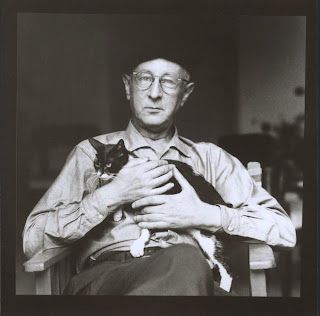Martinů: Duo No.1 for violin & cello
The 1927 Duo for
violin and cello was composed in the years when Martinů was the leading Czech
musical correspondent in Paris, shuttling back and forth to Prague and reporting
on the Parisian musical scene to the Czech cultural press. In Paris he studied
composition with Albert Roussel and assimilated many of the trends of the time
including jazz, surrealism, and neoclassicism. He was especially taken with
Stravinsky's music. During these years he likely heard such characteristic
works as Stravinsky's Octet, Concerto for Piano and Winds, and Serenade in A. But as much as one can
hear the influence of Stravinsky's neoclassical style in his music at this
time, Martinů's own voice clearly comes through.
One of the interesting features of the Duo
is just how incredibly close the violin and cello lines remain throughout the
work, both vertically, as they often share a narrow range of pitches, and
horizontally, as they nip at one another's heels in close or overlapping
imitation (stretto) and split phrases (hocket). Composer Mel Powell has given an
updated definition of 'counterpoint' as 'the art of creating multiplicity.' One
normally expects some sort of
counterpoint in a work for two distinct instruments, especially if one is
voiced in the upper register and the other in the lower. But Duo fails Powell's criterion almost
entirely (at least at the 'note-against-note' surface level). And this is where
its genius lies. If you close your eyes so that you don't actually see the two
performers, you begin to hear the work not as two distinct lines of notes tangling
and weaving in and out, but as a kind of ribbon of many colors – call it a 'hypermelody'.
(But remember, you have to close your eyes and just listen.)
Duo for violin and cello, 1927, Paris
1. Praeludium. Andante Moderato
2. Rondo. Allegro con brio
Jakub Junek (vl), Ivan Vokac (vc)
(Winners of Concertino Praga 2006, Rudolfinum, Prague),



Comments
Post a Comment